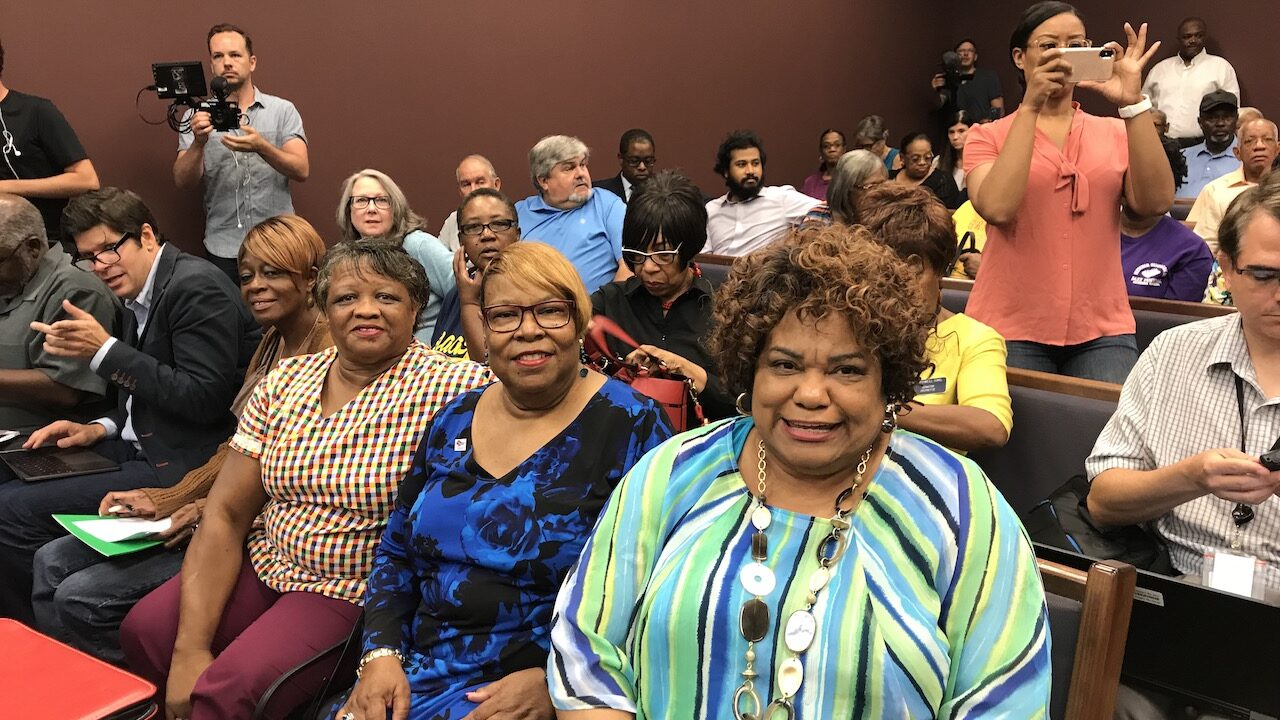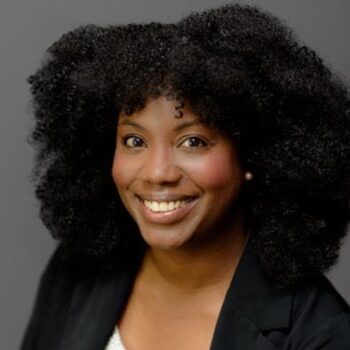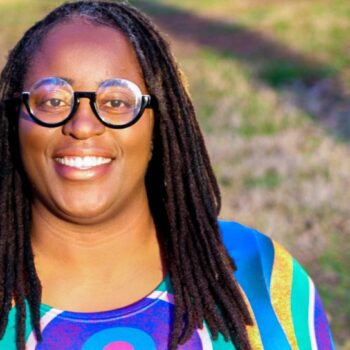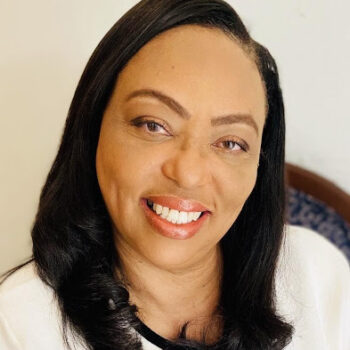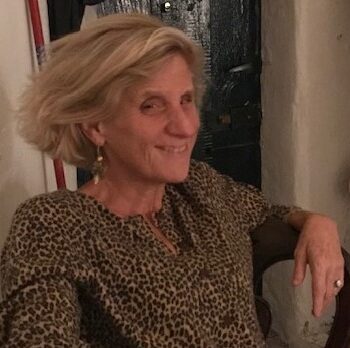Black women in the South are envisioning a new future for the region and organizing to make this vision a reality. In Georgia, Nsé Ufot leads voter registration and mobilization efforts to ensure a just and fair fight in an environment of disinformation and voter suppression; her organization has reached all 159 counties in the state. In Florida, Reverend Rhonda Michele Walker-Thomas conducts “Souls to the Polls” to mobilize voters and get the word out to formerly incarcerated individuals that they now have the right to vote. These kinds of efforts are key to elevating the needs and leadership of Black communities across the South.
And yet, the leadership of Black women is often unrecognized, their voices unheard and disregarded, and their work under-resourced. Like organizers across the country, Black women also struggle to juggle organizing with childcare and home-schooling, environmental assaults such as Hurricanes in Louisiana, and the current economic crisis. To address these challenges and support grassroots and political organizing led by Black women, Faith in Action organized a regional collective to anchor organizing expansion work in the South in the leadership of Black women and those directly impacted the legacies of slavery, Jim Crow, mass incarceration, and mass disenfranchisement.
Join a conversation with some of these women leaders — Nsé Ufot, CEO of the New Georgia Project (NGP), Reverend Rhonda Michele Walker-Thomas, founding Pastor of the New Generation Missionary Baptist Church and Phyllis Hill, National Director of Organizing, Faith in Action — as they talk about organizing in 2020, the barriers to building power for Black communities in the South, and how we sustain ourselves in this difficult work.
Here are some of the highlights from the conversation, edited and condensed for readability.
Phyllis Hill
Secky Fascione: Phyllis, how did you come to bring these incredible women together and for what purpose?
Phyllis Hill: My story begins in Hazelhurst, Georgia, a really small town of 5,000 people. I grew up primarily with my grandmother, and I think her story is the reason why I’m able to be in a great community with the members of Black Women in the South.
My grandmother taught me what it means to be a Black woman and to share myself in a very joyful way. She taught me to appreciate Black institutions. She was a staunch missionary Baptist church lady. She went to all of the meetings, all of them. She showed me how Black women show up in spaces even when they are not lead pastor. Black women did the work — ushering, getting the food, getting the communion together, cleaning up. My grandmother was deep into Eastern Star and Heroines of Jericho. These are orders that spoke to our Blackness and to our own culture. They spoke to who we are that was being defined outside of whiteness.
My grandmother was also an educator. She had gone to HBCUs. She taught at segregated schools and at integrated schools. She said the difference between the schools was the way segregated schools cared for and nurtured Black children but the integrated schools didn’t. Even though I couldn’t grasp it as a child, her point stayed with me. We always need to ask that question and not just about children. How do we care for and nurture Black people and ourselves. That’s how I show up in this work. It’s why we organize and how we organize. As Reverend Dr. Cassandra Gould, of Missouri Faith Voices, pointed out to me, it’s not about turning a state blue. It’s just as much about nurturing Black and brown communities. It’s making sure we invest in Black women.
When I met Nsé, she said she had 1,100 congregations and no money to move it. This was unbelievable to me. Why wouldn’t somebody want to invest in Nsé? Or Paster Rhonda? Or Stephanie Strong in Alabama? Aquila in Texas? Ashley in Louisiana? Tamika in Memphis? Why weren’t people investing in Black women? If we were going to move the South then we need to invest in Black women. That’s why we’ve come together into a community of Black Women of the South.
SF: What do you envision for the organizing we have to do in 2021 and beyond?
PH: First, we must believe in our own brilliance, believe in our own experience, and organize out of that. Just as Pastor Rhonda said, people have their own spirit telling them when something isn’t right. When they tell a rural community that has few jobs that they are going to build a prison but not a hospital, you should be pissed off about that. You have every right to be pissed off. I’m asking you to walk in that brilliance, that you know how to solve the problem.
Second, we have to organize our thoughts, organize our people, organize our money around a better life. That’s just basic organizing right there. As Black people, we’ve always been able to do that. We can organize out of our own culture, our own community. As Pastor Rhonda and Nsé are laying out, we can claim what we want. Don’t get worried or discouraged that it doesn’t fit into some neat C3 or C4 line; we have lawyers for that. We have to make sure our organizing strategies are attached to the legal strategies. We got to go for it. We have to do what’s right.
Third, we have to invest in the Pastor Rhondas and the Nsés of the world. They deserve budgets that can go from year in to year out. Too many have died too soon because of the stress, have died too soon because we just didn’t take care of ourselves and no one was able to take care of us. There are times where we couldn’t even have the healthcare we were fighting for and if we did have it we didn’t take advantage of it because we were so busy. Rest is important. Our budgets need to reflect that. Why not budget for sabbaticals?
For me, walking into 2021 is walking in healthy, walking in as best as we can be, and taking care of Black women.
Nsé Ufot
Secky Fascione: Nsé, how did you come into this work and this group? How are you building power and making change in Georgia?
Nsé Ufot: NGP is best known for our large-scale voter registration work, but it was never about putting VR numbers on the board. While I am super proud of the fact that we are coming up on our 500,000th voter registered in the state of Georgia, what’s more important is what adding half a million Black, brown, queer, and young people does to an electorate in a place like Georgia. A lot has been said about the changing demographics in our country, the browning of America if you will, and nowhere are those changes happening as acutely and aggressively as in the Deep South and particularly in a place like Georgia.
The demographic changes that are happening here are massive. They are happening very, very quickly, and they’re unique and unlike the shifts that are happening in other parts of the country. Two million people have moved to the state in the past decade and 81 percent of them are people of color. Unlike Arizona, it is not being driven by Latinx immigration. It is primarily being driven by what political scientists and demographers are calling the reversal of the Great Migration.
However, demographics doesn’t equal destiny. Even in a time where the world feels like it’s shifting under our feet, and demographics are changing, we were still losing. We absolutely have to organize. But people were doing this work as their 5-9, not their 9-5. There wasn’t an infrastructure for organizing despite the narrative that Atlanta and Georga is a Black mecca and the cradle of the civil rights organizations. We didn’t have a cohort of organizers who could connect a win with a win with a win until we’re building the power that we need. We were operating off of sheer intestinal fortitude.
There were these Black women holding up the sky. They are organizing while also working full-time jobs — and let’s keep it 100 percent real — also doing more than their fair share of domestic responsibilities. What does it look like to not suck every ounce of creativity out of us and leverage it for these short-term gains? What if we were able to keep some for ourselves and continue to invest in infrastructure so that Mississippi isn’t begging for dollars every time there is a potential to get a Black candidate elected statewide? What if there was year in and year out voter registration that was focused on building power over the long term? The reason that we keep kicking the Secretary of State’s behind in court is because it’s a part of our long-term strategy.
Stacey [Abrams] and I sought to launch the New Georgia Project back in 2014 to professionalize organizing and define what it means to win. Here’s the thing. Progressives across the country are very good at reframing losses as victories. “We didn’t lose that bad.” “Well, I mean they did have a 75 percent super majority in the legislature so we live to fight another day.” I want to get to a place where we’re actually winning. I’m obsessed with winning. I’m obsessed with winning for our families and then defending those wins beyond an election cycle.
I’m not going to be happy until Georgia’s $5.15 minimum wage is moved. And because our current crop of elected officials are not embarrassed by that wage, we are going to fire them. In order to do this we are going to have to invest. When I’ve traveled the country talking about investing in Black-led organizations and leadership, people shrugged. They dismissed us because of the narrative that they have about what it means to win in the South. There’s an assumption that we are not sophisticated. That’s not the case at all. We are criminally under-invested in.
There’s no path to victory without Black voters, without brown voters. There’s no path to victory without the labor of Black women. Many of our organizations are more effective than county and state parties. We are a proper part of a progressive ecosystem that is going to carry us through from one election cycle to another. People know it, so let’s stop pretending like you don’t rely on our organizations and on our work to get the job done. Let’s have a real conversation about what it looks like to win. Not these losses that we reframe as wins because, “Oh, it’s the South,” “It’s Jim Crow South,” etcetera.
The South suffers from bad PR. So being able to link up with Rhonda and Phyllis and our sisters in other states, helps us to push back on the narrative. We are doing incredible things with zero resources. We know what it means to invest in Black leadership. Investments are for the long-term. It means my family doesn’t hate me, and I don’t hate myself. It means I don’t quit and go back to doing family law so that I could help the ex-wives of really wealthy men get their just desserts and feed my family. It means I can keep doing the work.
That’s how I come to the work. Basically, I do whatever Phyllis tells me. I could have just started there and ended there quite frankly.
SF: Well, we don’t want you to go back into family law. We want you to keep doing this. If you are leveraging demographic changes and a diverse expanding electorate and truly building power, you have got to be freaking out the white power structure. What kind of pushback are you experiencing?
NU: What are we up against? There are currently 1,000 Georgians being investigated for what the Secretary of State is calling “voter fraud” or for “double voting.” There are 1,000 Georgians that are facing up to ten years in prison and $100,000 in fine. It’s a ridiculous charge. The Secretary of State failed to give people notice that they received their absentee ballots. Folks sent out their absentee ballot and never heard back about whether or not the county received it. So what did they do? They showed up on election day to vote and signed the affidavit that said, “Cancel my absentee ballot whenever it arrives.” Our voter protection volunteers monitored 25 polling locations that ran out of affidavits. People were instructed to just call the county when they got home. These same people are being investigated and possibly charged with voter fraud. It’s going to have a chilling effect on people’s participation in the election.
One challenge is that there haven’t been criminal defense lawyers with voting rights expertise since the passage of the Voting Rights Act of 1965. When we found out that basically there’s one lawyer in Georgia who is a criminal defense attorney who has defended clients in a voting case, we realized that we needed to do some training. Now we’re working with a lot of the criminal defense bars across the state to train them on how to defend clients in voting rights cases. Again, this is a missing part of the infrastructure. The scope, the scale, and the size of our work means that we are constantly running up against holes, gaps, deficiencies in the infrastructure.
A second challenge is we do this work behind enemy lines. There are counties in Georgia where people of color make up 70 percent of the county but there’s never been a Black mayor or a Latinx mayor or county commissioner. It’s an all white power structure.
I’m going to keep it all the way real. A real concern is retaliation. There is aggressive voter suppression coupled with violence. Georgis is an open carry state. You can bring your guns to church in the state of Georgia. I get phone calls in the middle of the afternoon about canvassers that are handcuffed sitting on a street corner. A police officer has been called because someone thought that they were casing the neighborhood and trying to plot a home invasion. Now what robbers are going to wear matching highlighter yellow shirts that say New Georgia Project Action Fund and pressed khaki pants and carry clipboards? Are you serious?
So, a part of our coalition — our legacy of civil rights veterans — is committed to non-violence. We are preparing folks to do voter protection at polling locations where we might possibly be met with violence. I think Dixiecrats, the good old boys, are really challenged in this moment because of the boldness of our plans and the boldness of our language.
Nobody is giving us the blues about defund the police like our well-meaning, well-intentioned white progressives. People want to police the language and not address the heart of the proposal. The crisis of imagination or lack of imagination on the part of the broader progressive movement is the third challenge that we are facing as we try to step out boldly. People want to put one foot in front of the other. They want to just keep their heads down and get by and get elected and believe that everything will go back to normal.
SF: The terrain is shifting fast. Are you experiencing the shifting moment as advantageous to our work?
NU: Absolutely. If there’s a silver lining to be found in this moment, it is that people are actually connecting the dots between the act of voting, this election, the fact that we don’t have healthcare, and the fact that 80 percent of the people that have been hospitalized due to COVID in Georgia are Black and brown. Folks are connecting the dots in really powerful and what feel like permanent ways.
There’s a maturity, a maturation, of the Movement for Black Lives and all of the justice movements. Reporters ask about whether or not people that are protesting are going to show up to go vote in November. The June primaries in Georgia demonstrated that folks absolutely are. There was historic participation in the Democratic primary in 2020 in Georgia in the middle of a pandemic.
The Governor and Secretary of State are playing games with elections. There’s a special election next Tuesday in Georgia to fill the unexpired term of Congressman Lewis, but there are also 113 people running so there’s going to be a runoff on December 1st. That means there’s an election before November 3rd and another one after November 3rd, and there’s also a candidate on the November 3rd ballot to run for the full two-year term. So imagine on a phone call or in a text message, because we’re not on doors, trying to explain to a young voter in Atlanta that they need to show up September 29th, November 3rd, December 1st, and January 5th. And we’re doing it, and it’s working. We knew that they were coming with all of their BS and because we are ready, we’ve been able to ride the ups and downs with our registrants and with our members.
If you stay ready, you don’t have to get ready.
Reverend Rhonda Michele Walker-Thomas
Secky Fascione: All eyes are on Florida because it’s widely believed that, as Florida goes, so will go the top of ticket and that therefore we may know earlier when some people say what the results are. We’ve all watched the game-changing work of Amendment 4 to bring our returning citizens back. Pastor Rhonda, the work you do is about leading as a person of faith, leading as an organizer, and building bridges across the incredible diversity of communities in your state. How are you feeling as an organizing leader? How do you feel about our chances of success? What strategies are working for you?
Reverend Rhonda Michele Walker-Thomas: I always ask “Where do I start as a faith leader?” I was introduced to racism at such a young age without much changing since then. I knew that as a faith leader my work went beyond the pulpit. We have to go beyond burying Black men and women, whether it’s from gun violence from our own peers or through the harassment of law enforcement. Our work has to go beyond allowing elected officials to come into our church and lie and pimp us for a season until they get into place. I believe I was called to do the work beyond the pulpit by building relationships — real relationships — with clergy across the state so that they too can go beyond the pulpit.
Without a shadow of a doubt, Florida is extremely bipolar. We’re at the point where we’re trying to understand and distinguish who is Black and who’s brown because in Florida brown is often brown at its convenience, or at their convenience. We need to bring all of that into one place to see that we have more in common than what separates us. We have won more locally by bringing all faiths together. We are sitting at the table having real conversations about the pain that lies in our communities and even in our own personal lives.
We’ve been strategizing on how we hold elected officials accountable, how we remind them who they work for, and how we win across the state of Florida. We’ve been organizing the largest Souls to the Polls in this state. We are going into areas that are often overlooked — those rural areas in North Florida like Jasper, Madison County, and Perry. These are areas no one normally even recognizes. We’ve been establishing great partnerships. For example, the Miami Heat is in partnership with Faith in Florida to push Souls to the Polls.
We are also very intentional about our ground-zero areas that are often targeted for voter suppression — Miami-Dade County and Broward County. We know that there are other areas as well that experience voter suppression like no other. We could see a little progress. Yet we also experienced in one precinct seven hundred voters being turned away because they were at the wrong precinct, and no one was there to direct them to the right precinct. In Broward County, voters were directed to a precinct that was closed. When they came back to say, “We went there, it was closed,” they were still not able to vote. They make it as hard as possible for Black voters to vote. Not even to make accessibility for the handicapped and our elderly people. They told us upfront, “We will not do that.”
So Faith in Florida has been a part of ten lawsuits against SOE offices in the state, and we won. Unfortunately, we have to keep reminding them of what the judge says. It’s been challenging, but the great thing is that I have so many faith leaders across the state who are playing an active part in monitoring what takes place during early voting and the day of the election. We’ve created boiler rooms where, if there’s a problem at a precinct, we have attorneys on site to respond because it’s hard to plan for the unexpected. Souls to the Polls is huge for us here in Florida. The Supervisor of Elections office knows that when those Black people get out of church, we’re going to close the precinct down. And they do. This is Black churches leading the work.
We are celebrating that we’re getting ready to have our first Latino Souls to the Polls in Orange County. That’s new for us. We’re also putting a lot of emphasis on the millennials. We are targeting our work so that they lead and attract other millennials to get out to vote. It’s been really, really successful in the planning process so we’re putting a lot of focus on voter turnout and protecting our votes in ground zero areas.
In addition to voter protection and voter turnout, we are assisting Desmond [Meade] and the work of the Florida Rights Restoration Coalition. Our churches are playing a major role with the fines and fees through financial support. We are gathering as many returning citizens as possible to go through the process of getting their fines and fees paid, helping them register to vote, and making sure that they don’t have a problem at the polls like some of them did during our primary last month. Desmond and I are like two peas in a shell in pushing this. It’s painful for me to know what he experienced this morning [Meade was denied a pardon by the Florida governor], knowing what all he’s put into it. It just gathers us together to be more pissed off.
SF: The other place Florida’s been in the news is about COVID and how COVID’s been managed. COVID’s had a disproportionate impact in Black and brown communities. How has that affected your organizing?
RTW: Well, it’s a big change. My daughter is on the frontline as an ICU nurse. My brother is coming out of retirement as a paramedic. My nephew is a firefighter. When it comes to COVID-19, I have three family members on the front line.
COVID-19 has changed our work in the way it affected the Black church. We’re not having church, we’re still doing virtual services. We are a beacon of light in our communities in registering people to vote, phone banking taking place in our churches, our canvassers coming from our churches. Now it’s virtual phone banking. It’s less personal type interaction. We are doing it differently but it has not detoured us.
I did a test with the primary to see if we can still drive people out to vote during a pandemic and the success of that was just unreal. People were just that much more determined. Now it’s like I prefer standing in a line — if I’m going to lose my life, I’m going to lose it for a reason. I don’t mind standing because we don’t really trust — not that we ever have in Florida — the vote by mail. It’s not new for us to have ballots stuck in a post office and the county mayor saying that they would never be counted.
We’ve taken the pissed off attitude to be more determined to do what we have to do to drive people out to vote. We can’t afford to lose this moment. We realize if we can change Florida, we could really change this country. All eyes are on us. I’m not talking about the way Tupac said it — all eyes are on Florida because we could hold up an election. If we’re going to hold it up, it’s because we want every vote counted. We can make some real stuff happen. I want every pastor in Florida to be just as pissed off as I am, and I don’t care what neck of the woods you come from. I want pastors saying they’ll monitor the counting because we want to make sure every vote is counted.
I’m learning from Phyllis how to agitate in a way that is getting some awesome results. I can see that happening. There is a sense of urgency and a sense of excitement.
Read the entire issue on Organizing in Rural America.
